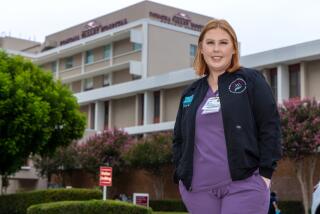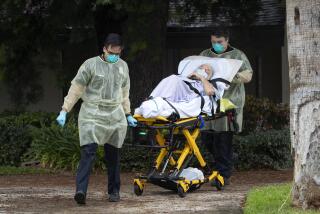Curing the Nurse Shortage
Money is not all that matters in remedying the growing shortage of registered nurses, but it matters most, according to a constructive report by experts prepared for the U.S. Department of Health Services.
The money question will confront Congress when it opens its new session, because a key recommendation of the health services advisory commission is for more federal money--including more Medicare money--targeted at increased compensation for nurses in hospitals, and more generous scholarships in nurse-training institutions. State legislatures also are challenged to increase Medicaid funding for nursing homes so that nurses can receive higher salaries.
More than money is at stake, however. The commission emphasized the importance of reforms to allow nurses to perform their professional health-care role more effectively, freeing them from the administrative and other chores that are unrelated to direct patient care. “All too often,”the report affirmed, “structures and processes of health-care delivery organizations diminish the professional-practice decision-making role of the nurse and leave the nurse to carry out fragmented ‘tasks.’ ” That, as the report notes, is something that affects the nurses’ “self-esteem as professionals and contributes to poor job satisfaction, high stress and high turnover rates.”
The report acknowledged progress in raising beginning pay to a national average of $22,000. There is little salary incentive after that, the report found. After six years, a nurse’s pay averages $27,000 nationally, while other professions would have enjoyed far greater increases over the same period.
The number of working nurses continues to increase--but at a slower rate, and at a rate that is inadequate to meet growing needs. This will be complicated in the future by declining enrollments in training for nursing--down 30% in California in the last six years, down 26% nationally since 1984.
Carolyne K. Davis, a nurse, served as the chairwoman of the commission. The findings give additional support to the effort now under way by the Hospital Council of Southern Californiato encourage interested men and women to call a new hot line at (800) 234-0080 to learn the latest about nursing career opportunities.
More to Read
Sign up for Essential California
The most important California stories and recommendations in your inbox every morning.
You may occasionally receive promotional content from the Los Angeles Times.










